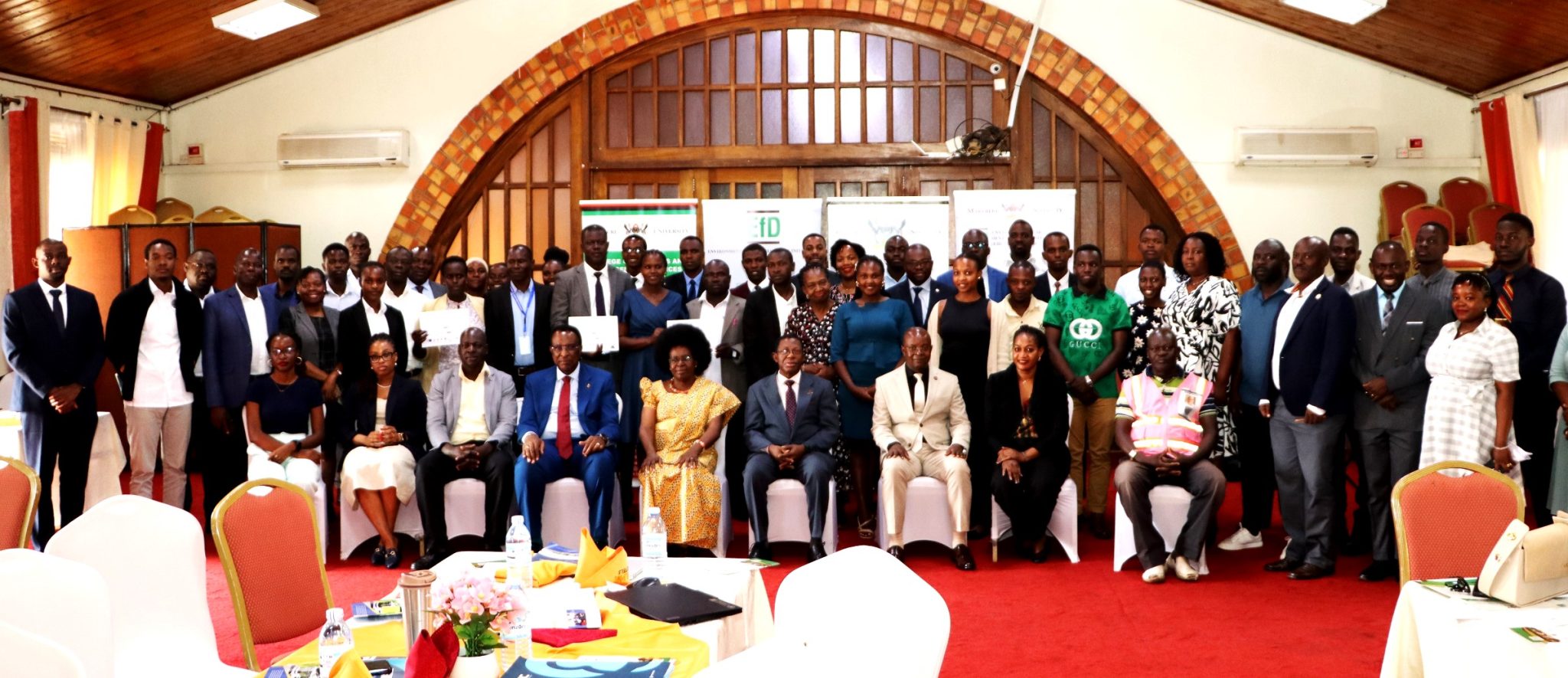The 4th Cohort of the Inclusive Green Economy (IGE) Fellows 2024–2025 has graduated with certificates at a colorful ceremony held at the Kampala Kolping Hotel. The new IGE cohort 2025–2026 was also introduced during the event. The fellows—senior public servants from five key government institutions—completed a year-long training on green economic transformation, focusing on reducing emissions in Uganda’s transport sector. The participating institutions included the Ministry of Finance, Planning and Economic Development (specifically the new Climate Finance Unit), Ministry of Energy and Mineral Development, Ministry of Water and Environment, the National Planning Authority, and the Kampala Capital City Authority (KCCA).
The IGE Fellowship, funded by the Swedish International Development Cooperation Agency (Sida), is a capacity-building initiative coordinated by the University of Gothenburg in collaboration with Uganda’s Makerere University. This year’s program brought together senior officials from Uganda’s public sector to address policy and practical challenges in promoting e-mobility and reducing transport emissions.
The graduation ceremony attracted over 120 participants from Uganda’s ministries and agencies in water, minerals, and energy, as well as private sector players, academia, and civil society organizations. Dignitaries from Makerere University, including Vice-Chancellor Prof. Mukadasi Buyinza, several deans, and commissioners were present. Also in attendance were representatives from Kira Motors, UETCL, and other stakeholders in Uganda’s emerging e-mobility sector. The event was presided over by the Swedish Ambassador to Uganda, H.E. Maria Håkansson, as Chief Guest. Other dignitaries included the Minister for Science, Technology and Innovation, Hon. Dr. Monica Musenero; the Vice-Chancellor’s representative, Prof. Buyinza Mukadasi (also Academic Registrar and Acting Deputy Vice Chancellor in charge of Academic Affairs); and the Principal of the College of Business and Management Sciences, who also leads the Uganda IGE program.
Sweden’s Call to Action
H.E. Maria Håkansson commended Uganda’s efforts to transition to a green economy and urged the country to lead Africa’s e-mobility revolution. Speaking at the ceremony, Ambassador Håkansson emphasized the importance of clean transport solutions for achieving climate goals and driving national development.
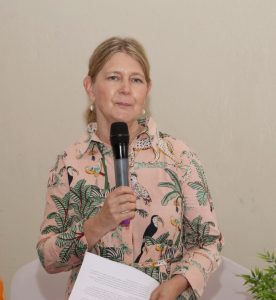
“It is a pleasure and honor to celebrate a cohort of professionals now better equipped to shape Uganda’s green economy,” she said. “This year’s focus on e-mobility is not just timely—it’s essential.”
She stressed that transitioning to electric mobility is more than a technological shift—it’s a paradigm change with broad social, economic, and environmental implications.
“Uganda, with its abundant renewable energy resources—solar, hydro, and bioenergy—is uniquely positioned to lead this transition,” she noted. “Clean energy must power clean transport.”
Drawing on Sweden’s experience, Håkansson said Swedish companies have set global benchmarks in electric vehicle technologies and infrastructure. She reaffirmed Sweden’s readiness to support Uganda in building a sustainable e-mobility ecosystem.
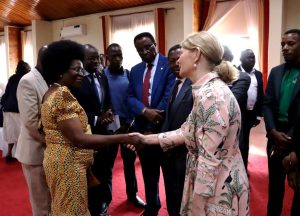
“Investment in charging infrastructure, incentives for EV production and use, and public awareness campaigns are essential to making this work,” she said.
She also called for a whole-of-society approach, urging collaboration between government, academia, the private sector, and civil society.
“It’s inspiring to see multi-sectoral representation here. This is exactly what’s needed to move from policy to impact,” she added.
A Message to the Graduates: Be the Pioneers
Addressing the 2024 IGE Fellows directly, Ambassador Håkansson described them as pioneers of Uganda’s green transformation.
“You have the knowledge, the skills, and the platform to influence policy, drive innovation, and lead by example,” she said. “Embrace that responsibility with passion and determination. Uganda’s future is in your hands.”
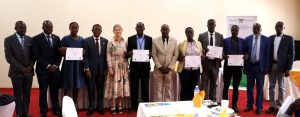
She concluded by congratulating the fellows and reaffirming Sweden’s commitment to supporting Uganda’s green economy agenda.
“Your achievements are not just personal milestones; they are part of a broader mission to ensure a better, cleaner, and more sustainable future for all.”
Minister Musenero Urges Integration of STI and Economic Policy
Minister for Science, Technology and Innovation, Dr. Monica Musenero, called for urgent alignment of science, technology, and innovation (STI) with economic policy to transition Uganda into a sustainable green economy.
She emphasized the role of public sector leadership in combating climate change through e-mobility, energy efficiency, and adaptive economic strategies.
“This cohort has shown what’s possible when we equip our civil service with tools and knowledge beyond traditional silos,” she said. “STI alone cannot transform our economy. Without the right incentives and economic policies, even the best innovations may not scale.”
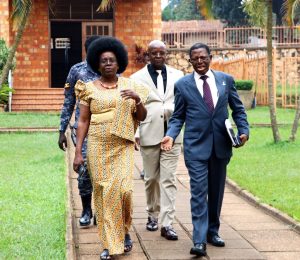
E-mobility was central to the fellows’ training. From motorcycles to buses, Uganda’s electric vehicle transition was presented as both an environmental necessity and an economic opportunity. Kira Motors Corporation was highlighted as a standout example that has inspired regional interest.
“Our transport sector is a major emitter,” said one program coordinator. “But through e-mobility and better planning, we can make real progress. That’s why we brought together not only policymakers but also private sector players, utility providers, and boda-boda operators.”
The IGE Program operates in Uganda, Kenya, Tanzania, Rwanda, and Ethiopia. It combines technical training, peer learning, and national policy engagement.
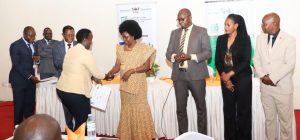
Fellows visited institutions in Rwanda, Kenya, and Ethiopia to exchange experiences and showcase Uganda’s successes—particularly the Kira EV initiative, which has become a regional benchmark.
Dr. Musenero emphasized Uganda’s commitment to using STI to meet its climate goals but cautioned against fragmented efforts.
“Africa may contribute less than 4% of global emissions, but we suffer disproportionately,” she said. “This is our moment to lead—not just through innovation, but by creating the right environment for innovation to flourish.”
Musenero Warns Against Passive Technology Adoption
Dr. Musenero urged African nations to stop passively receiving technology and instead harness it for economic sovereignty and relevance.
She argued that unless African countries take control of their role in the Fourth Industrial Revolution, they risk falling into cycles of dependency.
“We now have enough PhDs, institutions, and qualified leaders,” she said. “So it’s unacceptable that Africa receives this revolution as it did the last—awed by foreign inventions but unable to replicate them.”
While e-mobility is often framed as a climate solution, she urged fellows to focus on wealth creation, job generation, and manufacturing.
“Thriving means growing despite challenges. Harnessing is using innovation as a launchpad for prosperity. That’s the mindset we need.”
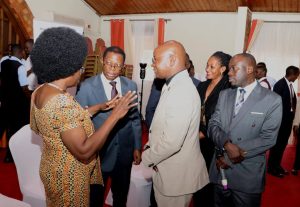
She warned that Uganda’s green transition must go beyond emissions reduction to address economic transformation.
Dr. Musenero offered a historical account of how past industrial revolutions left Africa behind—not due to lack of technology, but due to lack of understanding.
“The first industrial revolution didn’t start with a master plan—it started small and grew. But countries that embraced it changed forever. Africa, meanwhile, was herding cattle,” she said.
Now, with digital technology, AI, biotechnology, and green energy, Africa must act decisively.
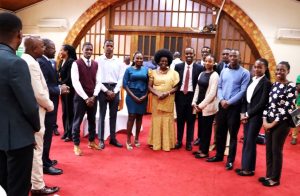
“We were unprepared then. But now we have the tools, the minds, and the responsibility.”
She concluded with a call for internships and deeper policy engagement, suggesting that all IGE Fellows be seconded to her ministry.
“We need you to think—not just about policies, but about the why. Why e-mobility? Why now? What does it mean beyond emissions?”
Makerere University Urges Fellows to Champion Uganda’s Green Future
Prof. Mukadasi Buyinza, representing the Vice-Chancellor, urged the graduates to become ambassadors of the green economy, leading transformative change.
He praised the year-long training as timely and vital for addressing regional environmental and economic challenges.
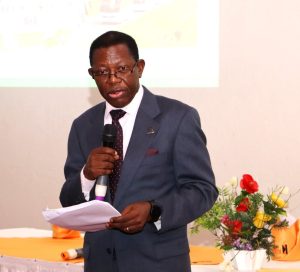
“Technology never solves problems without creating others,” he said. “As we develop, we must manage the disruptions that come with it.”
The program, supported by Sida and hosted by Makerere University, equips senior government officials with tools for green policy-making. This year’s fellows came from finance, energy, environment, and planning sectors—central to Uganda’s development.
Prof. Buyinza highlighted the inclusion of climate finance officers, planners, and engineers, noting that cross-sector collaboration is key.
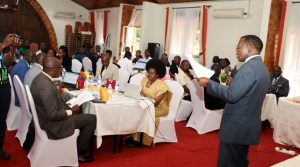
“This is how we build a green industrial economy,” he said. “Green skills, green jobs—that’s the call of the time.”
He celebrated the program’s regional scope, involving fellows from Uganda, Rwanda, Tanzania, and Ethiopia, and stressed knowledge-sharing across borders.
“This transition from diesel to electric vehicles offers real opportunities to improve air quality, reduce emissions, and modernize transport.”
He concluded by reminding graduates of their duty:
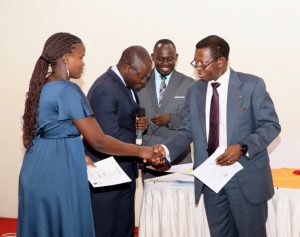
“You are our ambassadors. We count on you to deliver transformative, scalable programs that shape Uganda’s future.”
Prof. Edward Bbaale: “Seeds of Transformation”
Prof. Edward Bbaale, Director of the IGE Programme, described the initiative as a model of interdisciplinary excellence.
“You are seeds of transformation,” he said. “You’ve not just completed a course—you’re now champions of Uganda’s green transition.”
Fellows were drawn from five key institutions and focused on reducing transport emissions through energy efficiency and e-mobility.
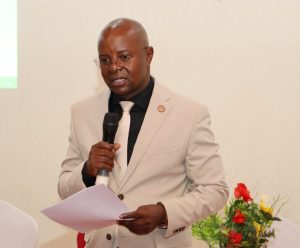
Prof. Bbaale emphasized the need for cross-sector dialogue and noted that e-mobility is not just about technology—it’s also about infrastructure, incentives, and economics.
“Scientific breakthroughs must be matched by sound economic policy,” he said. “Without the right tools—taxes, subsidies, regulation—green initiatives may stall.”
He pointed out that Africa, though contributing less than 4% of global emissions, suffers disproportionately, demanding urgent and pragmatic responses.
He lauded the regional scope of the program and Uganda’s leadership, particularly the Kira EV model, which has drawn admiration across East Africa.
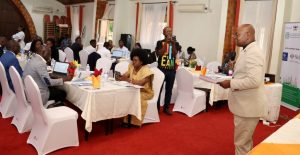
Prof. Bbaale credited Sida, the University of Gothenburg, Makerere leadership, and Dr. Musenero for bridging the gap between science and economics.
“Be the voice of change. Let your work reduce emissions, create jobs, and improve lives,” he urged the graduates.
The Journey of the 2024 IGE Fellows
When the 2024 IGE Cohort began in April, few anticipated the scale of transformation—both professionally and personally.
One fellow, Charles Ochen from the Ministry of Water and Environment, described it as “a lived experience in real policy transformation.”
Fellows engaged in immersive workshops, field visits, and practical sessions grounded in Uganda’s development context. A solar-powered facility visit early in the program emphasized the feasibility of renewables.
The cohort’s focus—“Energy Efficiency and Reduced Emissions in Uganda’s Transport Sector”—was timely. They studied everything from electric motorcycles to EV infrastructure.
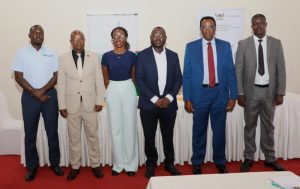
Doreen Ankunda identified key barriers:
- Unpredictable tax exemptions
- Lack of standards for charging infrastructure
- Limited fiscal incentives
- Low public awareness
Their policy proposal included:
- National charging infrastructure guidelines
- Stable EV-related tax policies
- Incentives for local assembly
- Public education campaigns
Fellows also participated in peer learning across the region. Uganda’s Kira Motors was praised, while insights from Kenya and Rwanda enriched their understanding.
Charles Ochen emphasized: “You can’t bring policy without bringing stakeholders.”
Panel Discussion and Closing Remarks
Panelists highlighted both opportunities and challenges in Uganda’s e-mobility sector.
Kira Motors, Uganda’s flagship EV manufacturer, reported progress: nine electric buses in operation, over 300 operators trained, and expansion plans underway.
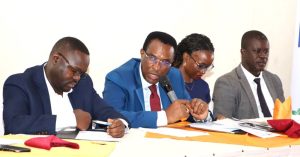
However, challenges persist:
- Low rural awareness and misinformation
- Shortage of trained EV technicians
- Limited charging infrastructure
- High EV costs for ordinary users
Policy gaps also remain. Drafts on EV standards and battery recycling await approval.
Commissioner Dr. Brian Isabirye stressed institutional alignment: “If Parliament can fund fuel cars, why not electric buses?”
Sweden’s ambassadorial team praised the IGE platform for uniting voices across sectors.
“Too often, we work in silos. This forum proves that dialogue leads to action.”
Monica Meeme is an Internee and Jane Anyango is the Communication Officer EfD Uganda

